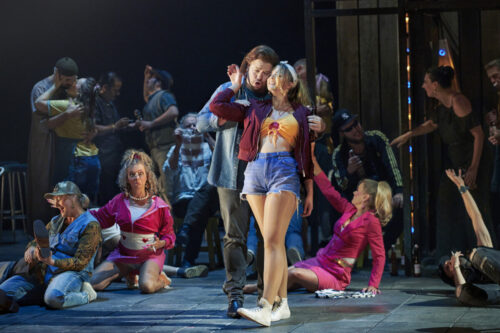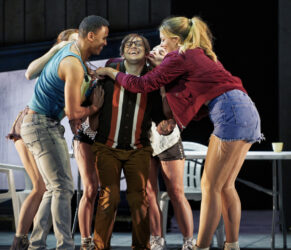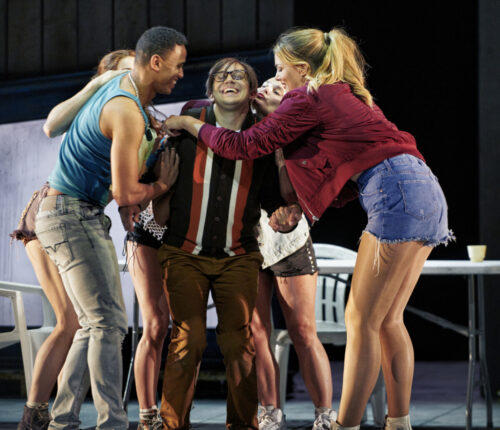 Sweden Smetana, Brudköpet (The Bartered Bride): Soloists, Chorus and Orchestra of Gothenburg Opera / Alevtina Ioffe (conductor). Gothenburg Opera main stage, 25.9.2022. (NS)
Sweden Smetana, Brudköpet (The Bartered Bride): Soloists, Chorus and Orchestra of Gothenburg Opera / Alevtina Ioffe (conductor). Gothenburg Opera main stage, 25.9.2022. (NS)

Production:
Director – Mellika Melouani Melani
Set – Ben Baur
Costume design – Uta Meenen
Lighting design – Joakim Brink
Choreography – Roger Lybeck
Libretto in a new Swedish translation by Fredrik Fischer and Linnea Sjunnesson.
Cast:
Krušina – Mattias Ermedahl
Ludmila – Pauliina Sairanen
Mařenka – Matilda Sterby
Mícha – Anders Lorentzson
Háta – Katarina Giotas
Vašek – Conny Thimander
Jeník – Adam Frandsen
Kecal – Mats Almgren
Circus director – Daniel Ralphsson
Esmeralda – Mia Karlsson
The acrobat – Jonas Egfors
Circus artistes – Lisa Angberg, Jesper Nikolajeff, Anna-Maija Nyman, Jan Unestam
Dancers – Julie Dariosecq, Nanna Larsen, Vadim Nuñez Belousov
If there could be one phrase to describe this vivid production of Smetana’s The Bartered Bride it would be ‘all in’. This autumn’s comic opera at the Gothenburg Opera is a high-effort operation and those efforts are largely rewarded. Director Mellika Melouani Melani avoids the folkloric elements common in productions of this opera and the superb new Swedish translation of the libretto sensitively modernises the language without changing the basic story.
Instead of being set in a nineteenth-century Czech village this production is set in a post-disaster near future in an economically depressed small town. Society here is Bohemian in the other sense: people clearly live in the moment and sex is in the air. This is made rather abundantly clear by many naked extras in various scenes in the first half of the performance. Unfortunately this stage business is more often distracting than atmospheric, in particular during the overture.
Mařenka (a terrific Matilda Sterby) gets to keep her clothes on but is clearly a warm-blooded young woman. Sterby plays her character with absolute conviction and is open to her vulnerability: her worries about not knowing much about her lover’s background and then her devastation at his apparent betrayal. Sparks fly in the duet that follows that discovery. Jeník can barely get a word in edgeways as Mařenka’s fury sweeps over him. Sterby has a remarkably well-developed soprano for a singer so early in her career, combining warmth, projection and solid technique to master Mařenka’s entire range and communicate her character’s passion.
Adam Frandsen’s Jeník is a superb vocal match for Mařenka. He has an attractive but also robust tenor that perfectly represents a strapping young man with a sad past. Their love duets are vocally and musically gorgeous. Frandsen convincingly portrays Jeník’s supposed selfishness to Kecal and cheekily bids up the price of ‘selling’ Mařenka to three times Kecal’s initial offer, so much so that the old gangster warns Jeník not to push his luck as Kecal has ways of making people disappear.
Mats Almgren’s Kecal is a many-faceted character: a cynic, verbal and legal manipulator, and clearly some kind of gangster with a flamboyant dress sense and an intimidating set of henchmen. I was concerned that it would be difficult to believe that Jeník would knowingly trick such a dangerous person out of a huge sum of money but the denouement at the end of the opera solved that problem nicely. I enjoyed this interpretation of Kecal and it certainly added an extra dimension of implied threat when Kecal explains to Krušina and Ludmila that marrying Mařenka to Vašek is the solution to their financial crisis.
Mattias Ermedahl was a sympathetic Krušina, whose financial vulnerability was underlined by his character being in a wheelchair. One of the most moving moments of the opera was when Mařenka, devastated after Jeník’s treachery, curled up in her father’s lap to be comforted. Pauliina Sairanen (substituting for Carolina Sandgren) made a solid first performance as Ludmila and threw herself into the character with gusto. Katarina Giotas made a magnificent first appearance as Háta in the opening to Act II, shepherding a very shy Vašek to the inn, even though she didn’t have a word to sing in that scene. Her husband Mícha is portrayed as a helpless drunk, not giving Anders Lorentzson much opportunity to shine. Háta is clearly the dominant partner in that marriage.

Conny Thimander was a superb and sympathetic Vašek. In this production Vašek has no stutter but is socially awkward more as a nerd (not that being under his formidable mother’s thumb has helped him develop a social life). Thimander’s tenor is light and attractive and brings out Vašek’s uncertainties and longings. His character blossoms wonderfully when he discovers the circus. Their entrance was memorable, complete with juggling chainsaws and Vašek being sawn in half! Indeed, it was in the third act that the production really worked well visually with spectacle and personal interactions working together.
The Gothenburg Opera Chorus showed an infectious zest for life both vocally and in their acting, most of all when both men and women were singing together. (Though a special mention must go to the male chorus members who had silent roles as Kecal’s thuggish henchmen – they were amusingly stereotypical!) Alevtina Ioffe conducted with such a sense of line that I barely noticed Smetana’s rather eclectic mix of different musical styles; under her baton the opera felt like a musical whole and was beautifully paced. The Gothenburg Opera Orchestra played beautifully and balanced well with the singers, while obviously thoroughly enjoying themselves in the big set pieces. For me the superb music and acting make up for the onstage distractions – it is hard not to be carried away with the passion and the humour.
Niklas Smith
Playing until 25 October, for more information and tickets see the Gothenburg Opera website (click here). Swedish Radio recorded the premiere (with Carolina Sandgren as Ludmila) and will broadcast on 22 October. The broadcast will be available to stream for 30 days after broadcast on the Swedish Radio website (click here) and SR Play app.
